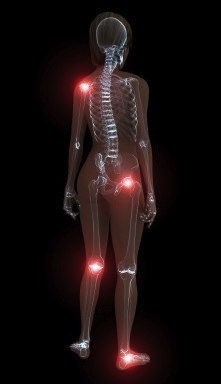Weight loss for arthritis
Weight loss for arthritis is an important subject because obesity causes degenerative joint disease.
Part I: Obesity and arthritis ...
Part II: Weight loss for arthritis ...
Effective Treatment For Osteoarthritis
Osteoarthritis is a painful joint disease common among the elderly and those who are significantly overweight. In fact, 70 percent of people over age 65 are affected by OA; and obese folk are at a particularly high risk of developing painful knees.
The total number of OA sufferers is likely to increase as the world's population continues to age and put on excess pounds. While not much can be done about growing older, being overweight is an important risk factor for a disease that can and should be addressed.

Why Obesity Causes OA: The Connection
Weight loss for arthritis
There are two ways in which obesity is thought to increase the risk for developing OA.
The first theory is that obesity leads to the breakdown of cartilage simply because excess weight puts too much force on the joints. The damage then leads to the development of OA. This theory is a plausible explanation for why knee osteoarthritis is more frequently linked to obesity than is the hip.
The knee is under more concentrated force than the hip. This theory does not offer an explanation for why obesity appears to also increase the risk for hand OA, however as it does not bear any weight.
This leads to the second theory, which states that excess weight results in secretion of a circulating factor that affects all the body's joints; hands, knees, and hips and causes cartilage to break down.
This theory offers an explanation for how obesity can cause OA even in non weight-bearing joints, like shoulders and hands.
Adipose tissue acts an Endocrine Organ
This theory finds support in the discovery of adipose tissue's role as an endocrine organ. The fat tissue secretes substances that are present at higher levels in the bodies of people who are overweight or obese.
Adipose cells generate peptides that are responsible for causing inflammatory processes, a chronic problem observed among the obese.
This constant low grade inflammation may damage articular cartilage, eventually leading to a diagnosis of OA.
Can Weight Loss Improve OA Symptoms?
Weight loss for arthritis
In 2007, a meta-analysis was performed on data from all the existing studies on the effect of weight loss on OA. This review of prior research was conducted in order to discover whether weight loss improved pain and function in people with knee OA. The findings showed that functional disability was indeed improved as a result of a moderate reduction in weight.
A loss of 5-10% of body weight was enough for overweight OA patients to experience relief of their symptoms.
The study recommended weight loss at the rate of 1.1 to 3.3 pounds per week, which can be achieved through several existing weight loss programs. For example, the clinically tested and medically designed Medifast or Nutrisystem weight management programs, complemented with the possible benefits of glucosamine and chondroitin sulphate supplements, may result in an ideal weight loss rate of 3 pounds per week and substantial decrease in articular pain.
Can Weight Loss Prevent OA?
Weight loss for arthritis
Among men in the Framingham OA study [2], losing weight was found to have a significant effect on the chances of developing OA of the knee. Specifically, the possibility of developing knee OA later in life would be decreased by more than 21% if obese men lost enough weight to be considered only overweight, and overweight men lost enough of their excess body fat to reach a normal weight.
The investigators noted that, if the obese men were able to lose enough additional weight to fall into the normal weight range, the decrease in the chances of presenting OA symptoms would be even greater.
If women managed to lose enough weight to drop down a category — from obese to overweight or from overweight to normal — development of knee OA would decrease by an impressive 33%.
In Summary @ Weight loss for arthritis
Research to date has not provided us with a clear-cut scientific explanation of the relationship between obesity, weight loss, and OA. But despite the questions that remain, we do have evidence that being overweight results in a significantly increased risk for developing OA of the hands, knees, and hips.
Whether this is due to extra stress on the joints or secretion of bioactive substances by adipose tissue, it is clear that weight loss, in combination with glucosamine nutraceuticals, should be considered an important part of any treatment plan for OA.
Weight loss reduces the disability, pain, and stiffness of osteoarthritis, and may also play an essential role in preventing the later development of OA in obese young people.
About the Author
Dr Matthew Constas, PhD, is a biology researcher who has developed a special interest in obesity and its relationship to diseases such as osteoarthritis. He enjoys providing information to the public through his blog, where he reviews weight loss programs and offers Medifast promo discounts and Nutrisystem discounts, two clinically evaluated meal replacement plans.
References
1. Obesity and inflammation--targets for OA therapy. Iannone F, et al. Curr Drug Targets. 2010 May;11(5):586-98.
2. Comparing two low-energy diets for the treatment of knee osteoarthritis symptoms in obese patients: a pragmatic randomized clinical trial. Riecke BF, et al. Osteoarthritis Cartilage. 2010 Feb 17.
Obesity and arthritis is part I
Obesity and arthritis are strongly linked.
ARE YOU OBESE?
Uncomfortable though the question may be, knowing whether you are simply overweight ( Body Mass Index 25-30) or obese (BMI above 30) is important.
It's not just about osteoarthritis, but heart disease, stroke, diabetes and a host of other very serious, painful and disabling diseases that await obese persons. Is your BMI over 30, or perish the thought over 35?
Type BMI into Google.
Hummus and high protein foods
Hummus is a simple high protein food to make at home.
There has long been interest in high protein diets, since Dr Adkins and probably earlier, some with low carbohydrate, some with low fat. All have merit but need to be treated with caution as weight loss for arthritis.
Both carbohydrates (such as in apples) and fatty acids (such as in fish and the fruit oils: olive oil benefits and avocado fat ...) should be regularly in the diet... extreme low fat diets especially are associated with serious neurological diseases.
There is increasing research proving that a diet high in animal protein is associated with many serious disease. To raise the protein in your diet, think rather of hummus or tofu ...

Vitamin B9, homocysteine and arthritis
It's complex biochemistry but there is much research coming out that an even worse enemy in the body than high LDL cholesterol is a toxic break down product of protein metabolism called homocysteine.
In the normal situation, homocysteine is rapidly metabolised in the presence of several vitamins and minerals, one of which is vitamin B9, folate. One of the consequences of high homocysteine is arthritis.
The break down of homocysteine, in the prevention of arthritis and many other diseases, is totally dependent on
high folate levels.
Useful links @ Weight loss for arthritis
When browsing these links use right click and "Open Link in New Tab", or you may get a bad gateway signal.
- Home
- Weight loss
- Weight Loss for Arthritis
Did you find this page useful? Then perhaps forward it to a suffering friend. Better still, Tweet or Face Book it.
